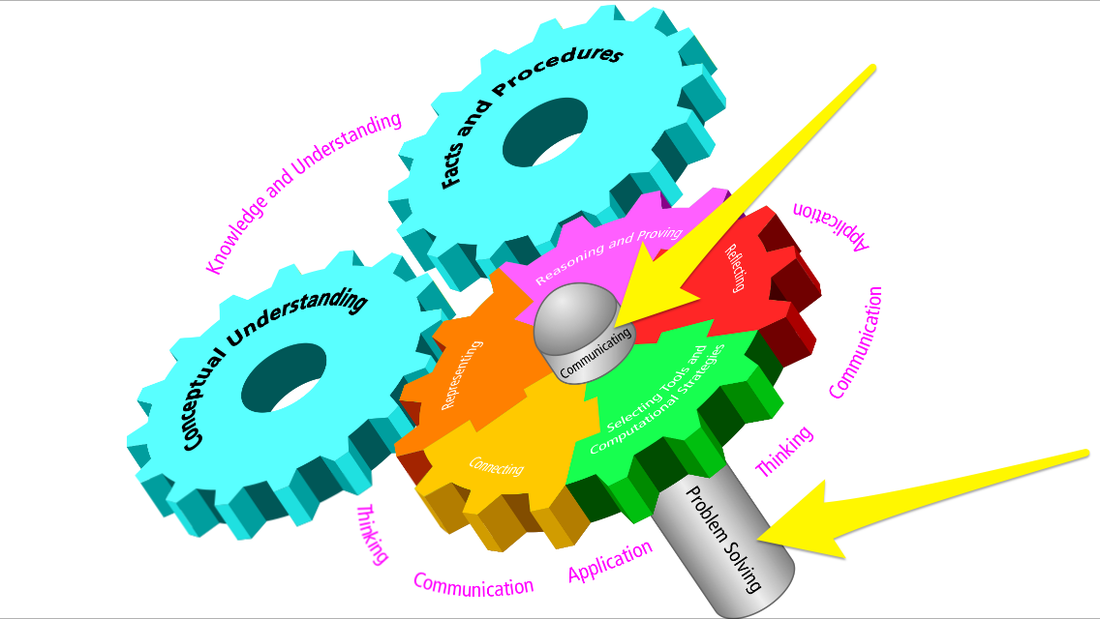Recently, I've been reflecting upon the use of open problems in teaching and learning mathematics.
A great, and inspiring, video that describes how teachers can further engage their students to getting excited about learning math is Dan Meyer's, "Math Class Needs a Makeover".
If you haven't seen this one yet, I highly recommed that you check it out (below) before continuing with this post.
In his address, Dan mentions that "the mathematics serves the conversation"--not the other way around. This is an incredibly important point. According to Dr. Marian Small, this communication (i.e., math talk) should primarily come in the form of meaningful discourse where students are comfortable talking about and defending their ideas and solutions. This is more difficult for students to accomplish when problems are prescribed and closed.
Thus, in order to get our students to talk about the mathematics and to foster independence in thinking (i.e., opposite to what Dan calls difficulty "self-starting" and an "aversion to word problems"), we need to engage them in open, relevant problems. The relevancy of problems can be derived from context, but Dr. Small also believes that context isn't always a/the reason for engaging in problem solving: curiousity can also be a "driver."
Take note that the idea of problem solving being a "driver" is not a new one. Problem solving and communication in math are "central to doing and learning mathematics." Consider the image (below) and the placement of problem solving in the system of process skills--a set of interrelated skills that students develop and use to engage in the process of learning through problem solving and solving problems.
important? Can't students just engage in open problems, using their process
skills, and still become numerate and great independent thinkers and problem
solvers?
As drawn from Grand Conversations in the Primary / Junior Classroom, student engagement increases when there is purposeful talk. So it appears that we need a bit of both--open problems and math talk to engage students in learning mathematics. It seems that you can't have one without the other--a great mathematics program/learning experience for students is contingent upon both teaching through problem solving and the quality and frequency of discourse in the mathematics classroom.
For getting math talk started in your classroom or to re-visit its principles, the following set of videos might be a great place to start. The first video features Lucy West beginning her presentation by mentioning that we want our "students to own the conversation."
This next set of videos (link, below) features Dr. Cathy Bruce describing the negotiation of meaning, math talk guidelines, and implications for teachers regarding establishing math talk communities in classrooms.
http://www.curriculum.org/k-12/en/projects/leaders-in-educational-thought-special-edition-on-mathematics
YOUR THOUGHTS?
In closing, I hope that this post has provided you with some great starting material (if you're beginning the journey into incorporating this pedagogy into your practice) or, in the case that you're currently working with this pedagogy, an opportunity to further reflect upon how we can continue to refine our practice to differentiating the mathematical experience to help all of our students succeed.
To help build community between educators, if you have some sources of great strategies (or your own strategies) for building a classroom culture of purposeful, math discourse, I would love to have you share them! Please feel free to use the comment form below and/or email me your ideas/sources that you'd like to feature on this site. Moreover, if you have some anecdotes about specific problems that you've used in class that have generated some great discussion and learning, also feel free to comment and/or share them. THANKS :)
As for building a mathematics program that is inquiry-based and full of engaging lesson problems, I would like to say that the transition, implementation, and maintenance of this type of program isn't prescriptive. No matter what part of a problem (from the myriad of websites, textbooks, expert resources, videos, etc. available at our fingertips) we remove, add or reword, there will invariably be differences of opinion in our students and different challenges that arise from them as they proceed to solve a problem (Marian Small). But ... This is a good thing; in fact, it's a great thing. Although, we're constantly assessing where the learning has gone/is going for our students, it's going that way because our students are driving the conversation/problem solving process--just the way it should be.
Thus, as we 'follow' our students through the use of open problems, you might find it to be extremely beneficial to engage in collaborative inquiry with some of your colleagues. During these times of job-embedded professional development, co-planning time (e.g., creating a 3-part math lesson), the co-teaching of lessons, and lesson debriefs (studying the mathematics in students' solutions, planning to consolidate, highlighting/summarizing, next steps) can offer us great insights into how our students think thus giving us the ability to refine our practice that much more.
As we move towards the end of April, the Annual Conference (OAME) will be soon approaching (May 8 to 10). Having the great privilege of presenting at this year's conference, I will be posting some of the session's experiences (in the form of videos and participants' feedback) to both this site and Facebook (at Flipping the Focus).
Also 'in the works,' there will be some ideas posted concerning the use of a flipped learning model in elementary grade-level classrooms and collaborative inquiry in mathematics.

 RSS Feed
RSS Feed


